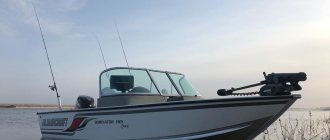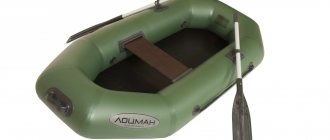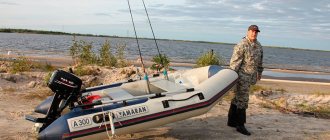The growth of new users of water-powered equipment has a steady growing trend. The boat is the most popular, comfortable and diverse type of water-powered equipment. According to their functional purpose, they can be recreational, sports, fishing, passenger, etc.
Potential boat owners who are purchasing water-powered equipment for the first time are interested in questions about the required set of documents provided for registering a boat, about the authority or institution conducting registration, and about the requirements for shipowners to operate a boat. But first you need to define the concept of “boat”.
According to current regulations, a boat is an engineering structure with a stationary propulsion unit, capable of moving on water and carrying loads and transporting people.
About the rights to operate water transport
Even the management of small river vessels is regulated by law, and more specifically by the state inspection of small vessels.
She:
- prepares registration and maintenance of vehicles;
- conducts examinations to obtain a certificate allowing to operate water transport;
- issues ship tickets.
The State Inspectorate (GIMS) is structurally related to the Ministry of Emergency Situations. GIMS issues a document to the driver that confirms permission to drive a small vehicle, upon successful passing of the exam.
Thus, if a person has a license, it means that he has studied the necessary theoretical and practical aspects required for driving a water vehicle.
However, you can get these licenses no earlier than the potential driver turns 18 years old, just like with a car license. There is still one difference; the license for the boat includes an additional note about the water area of the craft.
Multiple letters on the essence of the question
So, you have a boat that, by all criteria, is not subject to registration. What is its legal status? The same as a bicycle, roller skates and skates, or the full status of a small boat? The answer to this question is given in paragraph 3 of Art. 7 of the Merchant Shipping Code of the Russian Federation and Art. 3 of the Code of Inland Water Transport of the Russian Federation: a vessel whose length is not more than 20 meters and whose passenger capacity is not more than 12 people is considered small.
Thus, the legislator does not make any special distinctions in the legal status of boats subject to registration and “non-registered”. “Silver” with 200 hp, an inflatable with a 5 hp engine, a pedal boat, a pleasure rowing boat and even some two-meter “Dive” with a power plant of no more than 1 manpower with oars in hands - all this small vessels.
As you know, if a small vessel (hereinafter referred to as MS) is not subject to state registration, it does not require a license, ship ticket or numbers. Nevertheless, these vessels remain supervised by GIMS. When moving around the waters on such a vessel, you are still obliged to ensure the MS supply standards regarding the safety of passengers, know and comply with the Rules of Navigation, etc. The “alcohol” article, by the way, applies entirely to boatmasters of “non-registrants”.
Well, what about the documents?
I take my ID card out of my wide trousers
If the skipper of an unregistered MS has committed an administrative offense, the GIMS inspector who established this is obliged to draw up a protocol on the administrative offense. But if this boatmaster does not have a passport with him, then how will he do this? Will he write it from the words of the offender on some Vasya Pupkin? Everything is very simple. In this case, the inspector is obliged to detain the small vessel, and hand over the boatmaster (believing “that whiskers, paws and tail are my documents”) to the police for the purpose of identification. In this case, the police use detention until identification for a period of up to 3 hours as a security measure (Administrative Code of the Russian Federation, Part 1 of Article 27.5).
From the point of view of the Law, a GIMS official is obliged to do exactly this (see update at the end of the article). Of course, we are all human, “why spoil your vacation,” and “who needs to waste time,” etc. However, one must always remember that neglecting the norms of Chapter 11 of the Code of Administrative Offenses of the Russian Federation at the tiller of an unregistered boat has a chance to end (oddly enough) much worse than on an “adult” boat/boat.
Thus, it is highly desirable for the skipper of a small vessel to have an identification document (or a certified copy thereof) with him.
What about the rest of the documents?
Documents confirming ownership of a small vessel
Such documents are a purchase and sale agreement, a certificate of invoice, and a sales receipt. If the boat and motor were purchased separately, the listed documents must exist in nature for both. But do you need to take them with you?
First of all, you need to find out on what legal norm responsibility for not having documents for a boat is based.
According to Article 11.8.1. Code of Administrative Offenses of the Russian Federation Operating a small vessel by a navigator who does not have with him the documents necessary for admission to operating a small vessel:
...Driving a small-size vessel by a skipper who does not have with him a certificate for the right to operate a small-size vessel, a ship's ticket for a small-size vessel or a copy thereof certified in the prescribed manner, as well as documents confirming the right to own, use or dispose of the vessel he controls in the absence of the owner - entails warning or imposition of an administrative fine in the amount of one hundred rubles.
That is, the boat must have a license, a ship's license, and if you are not the owner, who cannot be observed on board at the moment, then also a power of attorney for the right to “own, use or dispose” of the vessel.
Of course, if the boat is not subject to registration, no license is required, and there simply cannot be a boat license. And in general, if we are talking about a boat that is not subject to state registration. registration, what kind of access to management can we talk about? Those. requirements 11.8.1 , it turns out, do not apply to boats that are not subject to registration .
Thus, we come to the conclusion that there is no need to carry documents confirming ownership of a boat that is not subject to registration.
However, some senior GIMS inspectors argue that it is not necessary to carry copies of title documents with you, that this is just a good, friendly recommendation from GIMS.
Others, no less senior, claim exactly the opposite and say that you need to carry certified copies with you.
From time to time, joint raids are carried out by the GIMS and the transport police. Which “hangers” are stolen more often? That's right, low-power. Sometimes along with boats. Therefore, if you are the owner of an “unregistered” boat, there is some possibility that the make/model of your boat or motor is on their list of stolen ones. You may be stopped to check whether you blew the engine. And in this case, what is your evidence? (C). Documents only.
In addition, legislation regarding MS is now changing (adding to) quite quickly. Today your boat is not registered, but tomorrow it is required to be registered.
Lyrical digression. Now dozens, if not hundreds, of boat models are being produced that are capable of moving normally under PLM up to 10.88 hp, and, at the same time, not all of them are “unregistered”. So is it possible, even for the smartest GIMS employee, to know everything about all the boats? But there is also “samostroy”. How will a GIMS inspector determine on the water whether a given boat is subject to registration or not without a boat passport? The engine speaks for itself, but how can a Gimsovite draw a conclusion about the mass of a boat model unfamiliar to him? Will he weigh it with his hand on the shore? Don’t think that I’m also campaigning for a boat passport. Simply, returning to the topic of state registration of the MS, there is another reason to think about whether it is correct to focus on the weight of the vessel?
Do I need rights?
Despite such strict control, not all boat owners need licenses. The law says that rights are needed for those funds that were registered in the register of the State Inspectorate. But GIMS does not register all vehicles.
For example, if you are the owner of a vehicle weighing less than 200 kg with an engine, and the engine power does not reach 10.88 horsepower, then you do not need to obtain a license. So, you will need a license to operate a vessel in the following situations:
- the power indicators of the craft reach and exceed 10.88 horsepower;
- the weight of the product is more than 200 kg with the full equipment presented on it;
- I own a sports boat with a long hull (more than 9 meters).
Having noticed that water transport fits these parameters, you must contact the State Inspectorate for Transport, pass an exam in theory and practice, and obtain official permission to operate the vehicle.
Exams, exams
Operating a motor boat or any watercraft with a motor will not be easy after training. It has already been said that studying is one of the mandatory parts of the entire process of obtaining a certificate. It ends with an exam. If a citizen cannot surrender it, a boat license cannot be obtained. There is no need to be upset - everyone has a chance to retake, or even several. As a last resort, you can re-listen to the course of lectures and then successfully pass the exam.
This process is divided into 2 parts. First you have to go through the theoretical part. Students will be asked several questions to help determine whether they have enough knowledge to operate a motor boat. Usually the theory is given in the form of a small test. But simple questions are not excluded. You should find out about the specific form of the theoretical part of the exam at your chosen educational institution.
As soon as the first stage is completed, you can proceed to a more important moment. It's about practice. Without it, a license for a motorboat or any other motorized watercraft cannot be obtained. This is the most important part of all training. And it is at this moment that many experience certain difficulties. After all, driving a ship is much more difficult than driving a car.
The practical part will be carried out exclusively on simulators. No one will allow students to pilot a real ship. Instead, they will have to perform several exercises on special simulators. If the process is successful, you can rejoice - the citizen will have a chance to obtain a boatmaster’s license.
Typically, exam results are issued by a special examination committee. Those who managed to take and successfully complete the navigator courses will receive a special conclusion - a certificate of completion of studies. This document is a must have for anyone who wants to legally operate motor boats. The certificate can only be replaced with a diploma of higher education as a navigator.
Which vessels are covered?
GIMS regulates the management of small vessels - types of watercraft whose hull length is less than 20 m, and they must also accommodate no more than 12 people. The power indicator cannot be more than 75 horsepower. Otherwise, the inspection will assign the product a different class.
Important!
An outboard motor, or rather its power, is not subject to inspection limits. The parameters are not limited.
Watercraft differ from each other in appearance, performance and control method. Therefore, all rights are divided into:
- Permit for jet skis (aka jet ski).
- Sailboat permit.
- For a motor boat (including a boat license or a boat license with a motor).
- Rights to a boat that combines both a sail and a motor.
- Permit for specific vessels.
For clarity, here are a few examples. Owners of boats need to apply and obtain a license for a motorized vessel. And for those who own a yacht, the sailing category is suitable. Typically, boat driving license holders have stamps in several categories at once.
Note!
The use of water transport for commercial purposes is prohibited by law; this is stated, among other things, in the captain’s certificate.
Education
In the case of vehicle drivers, everything is clear - it is enough to undergo a short training organized by private companies. But if we are talking about a document such as a license to a motor boat (or any other water vehicle), the educational component becomes more complicated.
The point is that citizens here are given more opportunities. It’s just more difficult to implement them. It's no secret that there is higher education that is related to maritime vessels. It is necessary to obtain some similar specialty in order to be eligible to receive a boatmaster's license. Not the most common, but possible scenario. You can get such an education either at a technical school or at a university.
Most often, the population chooses the more familiar and simpler path. Boat license training can be completed at specialized training centers. After completing the course, all students who successfully complete the process are issued a special certificate. It serves as proof of your boating skills.
Where can I get a boat license? To do this, a citizen must go to specialized driving courses. They are dealt with by various training centers. There are such associations in every city, but they are not as widespread as driving courses. Next, you will have to attend lectures for some time. On average, navigator courses last from one and a half to 6 months. Only a few educational institutions offer annual training. This process in general is not too long.
Accordingly, the entire training course is divided into two parts - theory and practice. The first option is listening to lectures. Many educational institutions now even allow you to take this course remotely. How to get a boat license? Successfully complete training, pass a medical examination, and then submit documents to a designated location to be issued an appropriate certificate. It doesn’t matter how exactly the course of lectures was attended - in person, in absentia or remotely. The main thing is that the exams are passed in full.
The second part consists of practice. Many people wonder how exactly this process occurs. After all, you need to somehow learn in practice how to operate a particular vehicle. When obtaining a driver's license, everything is very clear - students practice on real cars. What about ships? Practical classes will take place only on special simulators. After all, without a boatmaster's license, citizens are prohibited from going to sea. If the theoretical part of the training can be skipped or listened to incompletely, then the practice should not be neglected. Citizens point out that applying for a boat license is very problematic. And this is even taking into account all the theory learned and practice gained. Many simply cannot cope with training.
Where can I go sailing?
Having received his license, the newly appointed captain will notice a special mark. The abbreviation on the certificate means those waters in which a person has the right to operate his watercraft. In Russia, there are several territorial categories. Inland ones are rivers or lakes that are unsuitable for navigation.
Those who have received the inland waterway mark can navigate rivers designated for small boats. And finally, sea routes - the captain can take his craft out to sea or a large lake.
Types of rights
The GIMS carries out certification for obtaining driving rights in the following categories depending on the type of small vessel:
- jet ski;
- small size (motor vessel, sail-motor vessel, sailing vessel, vessel of a special design).
In addition to the category of the vessel, the license indicates the area of permitted navigation. This is a navigation area where the skipper has the right to go.
The navigation areas into which small vessels are allowed to sail include:
- Inland waters. These are lakes, not navigable rivers.
- Inland waterways. These are navigable rivers where the rules of the GDP apply to navigation.
- Internal sea waters and territorial sea of the Russian Federation.
- Sea coastal waters with a distance from the coast of up to 20 miles.
When specifying a specific navigation area, the vessel's sailing range from the shore is established. Thus, the previously existing categories for the right to operate a small vessel “boat”, “motor boat” have been combined into a new category “small motor vessel”.
How can I get a boat license?
Not everyone will be able to obtain a boating license. This is due to the fact that training is possible only in large cities of Russia.
You can always go to a private school and study there, because their certificates are valid for GIMS. It will take 1.5-3 months to study. It depends on what kind of swimming device you bought or are planning to buy.
After successfully studying and receiving a certificate, the captain will not receive his certificate. First, you must undergo a medical examination to determine your suitability for driving certain water transport. And only then, at the discretion of the doctors, the citizen is allowed to take the exam.
The future captain needs to know how to operate a boat, how to fix it in case of a malfunction, and how to provide first aid to those in need. And in practice it will be necessary to show how he learned to manage his product. Just on the 11th day after passing, you can appear at the State Inspectorate for Medical Information (GIMS) to obtain your long-awaited license.
Scheme for registration of rights to a boat in GIMS
After purchasing a boat, the ship owner must:
conduct an initial inspection of the boat (vessel), where the numbers of the boat and engine are compared with the passports for the boat and the engine;- submit the documents necessary for registering the boat to the State Inspectorate for Inspectorate;
- receive a ship's ticket;
- equip the boat with the necessary supplies, which are recorded in the ship's ticket;
- undergo a technical inspection of the boat.
To register a boat, the shipowner provides the following documents to GIMS:
- an application card of the established form (usually filled out electronically by GIMS employees after submitting all documents);
- identity document (+copy);
- TIN (copy);
- originals and copies of documents confirming the legality of the purchase of a boat (vessel) and engines (outboard motors);
- copies and originals of technical passports for the boat (vessel), engines or outboard motors;
- documents confirming payment of the fee for registration of the boat (vessel) and the issuance of a ship ticket.
After going through the necessary procedures to obtain the right to operate a boat, and registering the boat with GIMS, you can thoroughly enjoy your vacation on the water.
What documents do I need to take the GIMS exam?
When coming to the GIMS and wishing to obtain permission to operate a vessel, a citizen must bring with him a certificate received from medical workers indicating his fitness to operate a vessel, and a license. For your personal file, you should bring 4 photographs 3 by 4. A receipt from the paid state fee for passing the exam in the amount of 1300 rubles. and a certificate of completion of courses are also included in the list of required documents.
Important!
It is important to remember that such rights must be changed every ten years. There is no need to take the exams again. Upon expiration of their validity period, the rights are invalid.
Algorithm for obtaining an ID
The process of obtaining rights can be divided into several main parts. Each of them will play a significant role, so you need to approach them carefully. This algorithm will also allow you to clearly think through your plan of action and avoid mistakes. So, obtaining rights to a vessel now consists of the following stages:
- Collecting documents.
- Go through a medical examination and receive a certificate.
- Get full training.
- Passing exams at GIMS or courses.
- Submitting an application for the issuance of rights and obtaining them.
Appearance of the license to operate water transport
The document looks from the outside like a neat laminated A7 card with information about the captain. On the front there is a photo of the driver, his full name, date of birth and place where he lives.
The long number is the series and number of the license; it will be needed to find the driver in the registry. At the rear there is information about the type of vessel that can be operated, as well as the waters where this operation can be carried out.
A document such as a driver's license must be kept with the captain at all times. If the police stop the boat and the driver does not have a license, he will be given a fine and the vessel will be towed to a specialized parking lot.
Responsibility of drivers of small boats
The owner of the vehicle bears full administrative responsibility for the operation of the vessel. At the same time, legislative acts and regulations prescribe a number of restrictions, including the following:
- Driving a vessel without a certificate confirming the right to drive (driver's license).
- Using a vehicle that has not passed state registration (if the vehicle has parameters requiring mandatory registration).
- Driving while under the influence of alcohol or drugs.
- Exceeding the established speed limit.
- Dangerous maneuvering near crowded places (beaches, harbors, piers, etc.).
- Assigning the functions of a navigator to a person who does not have a license to drive small vessels.
- Operating a vessel without painted side marks, as well as intentionally disguising or damaging identification markings.
- Entering closed waters without appropriate permission.
- Re-equipment of a vehicle without permission received from the State Traffic Safety Inspectorate.
Failure to comply with administrative requirements entails liability. Minor offenses are subject to fines from 300 to 500 rubles. These include violations of navigation rules, speeding, parking in prohibited places, etc. Moreover, for the first time, inspectors may limit themselves to a simple warning, but repeated commission of offenses will result in deprivation of rights for up to six months.
A number of offenses are punishable by more severe sanctions. For example, the fine for driving a boat without a license is estimated at 1-1.5 thousand rubles. Also, the fine for driving a boat that is either not registered, or has not passed technical inspection, or has damaged side numbers ranges from 500 to 1,500 rubles for a single violation. Driving a boat while intoxicated can result in deprivation of your license for up to 2 years. By the way, the same sanctions are provided for refusal to undergo a medical examination.
Upon detection of a violation, GIMS inspectors draw up a corresponding protocol, which is subsequently sent to the court. The consideration of the case usually takes up to 2 months. In this case, the shipowner, if he does not agree with the requirements presented, can protest the protocol during the court hearing.
Responsibilities of the ship manager
Driving a vehicle is a big responsibility, both on land and in water. The boatmaster has responsibilities that must be observed to ensure his own safety and the safety of surrounding citizens.
He should know all the rules that the state has established in the field of shipping. It is necessary to check the vessel every time before going out into the water. If there are guests on the ship, you need to take care of their safety and know how to apply first aid if necessary. Accordingly, have a first aid kit.
The driver must always have a driving permit with him, comply with the requirements of the State Traffic Safety Inspectorate, and be sober and attentive. The integrity and safety of others depends on it.
To find out whether owners of motor boats need to study for a license, watch the video at the link:
Documentation
What will the future boatmaster have to bring in order to have official rights to operate a motorized vessel (or a self-propelled one with certain parameters)? The list of documents is not too long. You must present:
- passport of a citizen of the Russian Federation;
- documents for the vehicle you plan to drive (if any, along with the ship's ticket);
- application for issuance of a boatmaster's certificate;
- diploma of higher education related to navigation (if available);
- state duty (payment receipt);
- certificate of successful completion of specialized courses for navigators;
- medical certificate of health in the established form;
- photographs (3-4 pieces, color, size 3 by 4 centimeters).
You will need to bring copies of all of the above documents with you. The only exception is a medical report. It must be submitted only in the original. A certified copy may be attached. Nowadays, many require only a glimpse of the passport and medical certificate in the original, and attach photocopies to the application.
How much will you have to pay as state duty? At the moment, you will have to pay 1,300 rubles to obtain a license. This is for issuing a certificate. If the vessel has not been registered with the GIMS, you will have to pay an additional fee of 1,600 rubles.
After submitting the application, the boatmaster will be told when you can return for your license. You must pick up the document with your ID (passport). That's all. Now motor boats are no longer under control restrictions.
Exams
What to expect in the GIMS exam and how to pass it the first time?
And now the most exciting stage! However, what should avid fishermen be afraid of? All you need to do is pass the theoretical and practical parts.
Theory exams are taken for each type of vessel you wish to operate and the area of navigation. The well-known method of testing on a computer is used (just like when getting a car license). You will simply need to choose the correct answer for each question.
By the way, on the website of the Ministry of Emergency Situations there are tickets for the theoretical part of the exam. But you need to find the right answer yourself.
There is good news:
- Mistakes are acceptable! But no more than two. It’s better not to argue about mistakes with a GIMS employee; most likely, he will be right.
- If during the exam you daydreamed about a rich catch and did not pass the theory, you can retake it in a week. So don't give up!
GIMS staff will inform you about the time and place of the practical exam. The principle is the same as when obtaining a license: you need to do several boat maneuvers. Mistakes, as in the case of theory, are allowed (maximum two), but there should be no gross mistakes.
A retake is also possible in a week or later.
Information for those who want to get a sailing yacht license! Not all GIMS divisions have such vessels. If this is the case for you, look for an understanding sailing yacht owner who will be willing to lend it to you for your test.
So, the exam has been passed, the mood is good, it’s time to get your license!
Obtaining rights and fines for their absence
All that’s left to do is get the desired certificate in your hands. Most likely, your license will be given 1-2 weeks after the exam (maybe a little earlier, maybe a little later - you will definitely be notified about this).
If you don’t have a license at all (that is, you didn’t receive one), the fine is for sailing on a boat weighing more than 200 kg and with an engine of 10.88 hp or more. will range from 10,000 to 15,000 rubles. And you won’t challenge this in court: you can’t sail on powerful motorboats without getting a boatmaster’s license! If you forgot your license at home, a fine of 100 rubles or a warning, but the boat may be detained until the certificate is presented.
Did you find our article about how to get a license for a motorized boat helpful? Write comments, ask questions and don’t forget to visit our store. There's definitely something useful for you there!
We wish you a safe, calm and quick receipt of your fishing license! Remember that following the rules on the water is no less important than on the road.
Happy fishing to you!
Question answer
Question: How can I quickly get a license for a boat with a motor to go to sea?
Name: Daniel
Answer: Anyone who wants to get a license to operate a motor boat needs to go through specific stages: a medical examination, training for a license, submitting documents to the State Inspectorate for Motor Vehicles, passing exams. If everything goes well, the license will be issued. All this can take from 2 months to six months.
Question: How to properly obtain a boat license so that you can sail?
Name: Azat
Answer: The main thing is to undergo training and pass exams, which consist of theory and practice. There are no secrets - you need to know all the rules and be able to apply them so as not to raise doubts among the GIMS inspectors who take the exam.
Question: Where can I get a real boat license?
Name: Tagir
Answer: GIMS is responsible for the registration and issuance of boatmaster’s certificates. However, before that you will have to visit other places.
Question: How to register a boat without getting fined?
Name: Yaroslav
Answer: A person is liable before the law for the purchase or falsification of rights, as well as for their absence. Rights must be obtained only legally through GIMS employees.
Share link:
Where can I register a watercraft?
The watercraft must be registered at the place of residence of the intended owner in the GIMS. Submission of documents for registration must be carried out within ten days from the date of purchase of the vessel.
First you need to make sure that the boat is safe. If, before registration, the boat encountered conditions in which breakdowns occurred, you must provide the GIMS with a certificate stating that the breakdowns have been eliminated and the boat can be considered reliable and ready for launching. After this, you need to collect a package of documents to submit to the inspection.
Documents for boat registration
For registration, the following package of documents is required:
- a check or an agreement for the purchase and sale of a watercraft, or an agreement for the transfer of the asset as a gift
- TIN
- technical passport(s) for the boat and motor (if available)
- passport, boat owner
- statement
- receipt confirming payment of state duty
- passport confirming passing a technical inspection
There is only one collection of documents; registration takes place in several stages:
- In the GIMS itself (or you can call an inspector from there), an external inspection takes place on the shore and tests on the water of the vessel and on this basis a report is drawn up.
- In case of successful inspection, the package of documents is sent to the same GIMS
- After registration, a ship ticket is issued, the period for issuing it is from one to three weeks.
- After receiving the ticket, side numbers are applied to the boat.
After successfully completed registration, do not forget about undergoing a technical inspection once every five years!
Registration is available to any citizen of the Russian Federation who has reached the age of sixteen.










